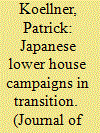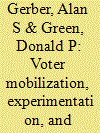| Srl | Item |
| 1 |
ID:
086138


|
|
|
|
|
| Publication |
2009.
|
| Summary/Abstract |
Electioneering for the Japanese Lower House has undergone significant changes in recent years. While voter mobilization strategies still figure prominently in the local-level campaigns of individual candidates, political parties increasingly use voter-chasing strategies at the national level. Such chasing strategies, whose manifestations in Japan have so far included the manifesto and the media-spin approach, target in particular the growing number of independent voters. The concurrence of elements of continuity and change in electioneering has led to a "hybridization" of Lower House election campaigns. The article examines this phenomenon in the light of newer conceptual and theoretical approaches to electoral politics in democratic settings.
|
|
|
|
|
|
|
|
|
|
|
|
|
|
|
|
| 2 |
ID:
145091


|
|
|
|
|
| Summary/Abstract |
Despite its prevalence, little is known about when parties buy turnout. We emphasize the problem of parties monitoring local brokers with incentives to shirk. Our model suggests that parties extract greater turnout buying effort from their brokers where they can better monitor broker performance and where favorable voters would not otherwise turn out. Exploiting exogenous variation in the number of polling stations—and thus electoral information about broker performance—in Mexican electoral precincts, we find that greater monitoring capacity increases turnout and votes for the National Action Party (PAN) and the Institutional Revolutionary Party (PRI). Consistent with our theoretical predictions, the effect of monitoring capacity on PRI votes varies nonlinearly with the distance of voters to the polling station: it first increases because rural voters—facing larger costs of voting—generally favor the PRI, before declining as the cost of incentivizing brokers increases. This nonlinearity is not present for the PAN, who stand to gain less from mobilizing rural voters.
|
|
|
|
|
|
|
|
|
|
|
|
|
|
|
|
| 3 |
ID:
149370


|
|
|
|
|
| Summary/Abstract |
Field experiments on voter mobilization enable researchers to test theoretical propositions while at the same time addressing practical questions that confront campaigns. This confluence of interests has led to increasing collaboration between researchers and campaign organizations, which in turn has produced a rapid accumulation of experiments on voting. This new evidence base makes possible translational works such as Get Out the Vote: How to Increase Voter Turnout that synthesize the burgeoning research literature and convey its conclusions to campaign practitioners. However, as political groups develop their own in-house capacity to conduct experiments whose results remain proprietary and may be reported selectively, the accumulation of an unbiased, public knowledge base is threatened. We discuss these challenges and the ways in which research that focuses on practical concerns may nonetheless speak to enduring theoretical questions.
|
|
|
|
|
|
|
|
|
|
|
|
|
|
|
|